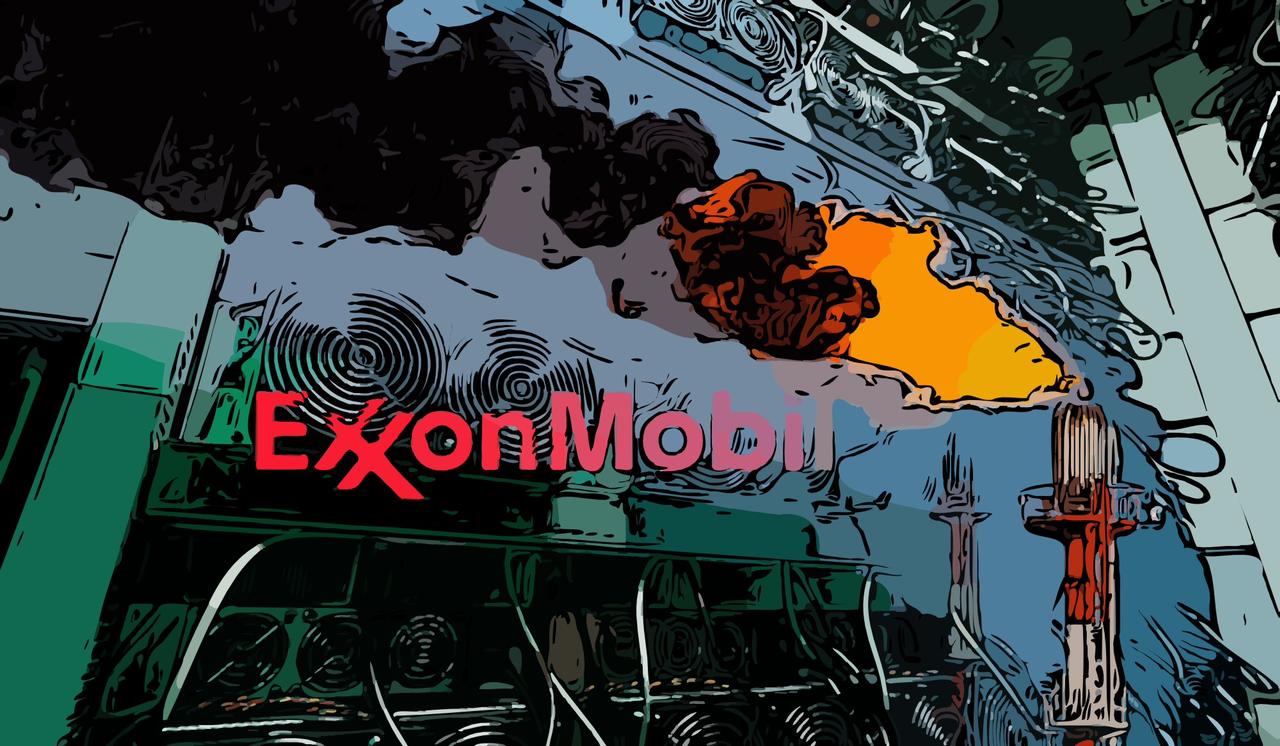Excess natural gas that would have been burned off – or “flamed” – due to a lack of pipelines is now being used to power cryptocurrency miners.
Important points
Bloomberg reported on Thursday that Exxon Mobil is testing a pilot project to use excess natural gas that it can’t ship as a source of electricity to power crypto miners who need power to run proof-of-work (PoW) data centers.
Miners for PoWcryptos like Bitcoin, Ethereum, Dogecoin, and others use a lot of electricity to power computer servers that solve complex codes required to verify blockchain transactions, unlocking or “mining” crypto as a reward for their efforts.
Due to a lack of pipelines, energy producers must burn off some of their natural gas, squandering the extra fuel and going to release it back into the environment with no benefit.
The goal of this pilot project is to change that.
According to a Bloomberg report published yesterday, Exxon Mobil, a U.S.-based energy company, is conducting a test project to use excess natural gas it produces but cannot ship as a source of electricity for energy-hungry cryptocurrency miners. Miners for proof-of-work (PoW) cryptos like Bitcoin, Ethereum, Dogecoin, and others use a lot of electricity to power and cool computer servers that solve complex codes. Solving those codes is what validates blockchain transactions, allowing each blockchain to remain operational.
Using Bitcoin as an example, the first miner to obtain the exact code for a transaction is rewarded with some of the original Bitcoin software’s 21 million Bitcoin. After completing an in-game challenge, crypto mining is similar to decrypting a new level or reward in a video game.
Regardless, crypto mining requires a lot of energy, and PoWcryptos have been chastised for being bad for the environment. This Exxon Mobil beta test, on the other hand, has the potential to change that negative narrative while also assisting big energy in doing the same in a profitable and efficient manner.
Details on converting unused natural gas into cryptocurrency
According to the article, Exxon Mobil has entered into an agreement with Crusoe Energy to use excess natural gas from North Dakota oil wells to power nearby Bitcoin mining activities. The crypto initiative reportedly needs 18 million cubic feet of natural gas each month, which is half a percent of Exxon’s daily production volume in that state.
According to the article, the North Dakota program began in January 2021 and could be continued to expand to Alaska as well as Germany, Guyana, Argentina, and Nigeria outside of the United States.
It is environmentally friendly to mine cryptocurrency using “flamed” natural gas.
From the perspective of crypto miners, electricity produced by natural gas emits nearly half the greenhouse gas emissions as electricity generated by coal.
OUR FAVORITE BITCOIN PLAY IS NOT A TOKEN – HERE’S WHY
We’ve discovered one company that has perfectly positioned itself as a long-term picks-and-shovels remedy for the broader crypto market — Bitcoin, Dogecoin, and all the rest. In fact, you’ve most likely used this company’s technology in the last few days, even if you’ve never had an account with them or even heard of them. That’s how widespread it’s become.
Sign up for Stock Advisor today to obtain access to our exclusive report on this company and its potential as a long-term investment. Learn more and get started with a special new participant discount today.
Get started
Moving natural gas requires pipelines, which cannot always safely accommodate the total amount of supply they capture. Because of the pipeline shortage, they are frequently forced to burn off – or “flare” – the excess gas or vent it into the atmosphere. This waste harms both the environment and the profits of the producer.
Investors, regulators, and environmentalists are increasing pressure on gas and oil companies to reduce their carbon footprint in order to mitigate negative climate effects. Reducing the amount of flared gas waste is a step in the right direction. While the fuel is still burned as part of this crypto project, it replaces the normal fuel that would have been used in the crypto-mining operation otherwise.
Furthermore, the excess fuel is most likely sold at a discount to crypto entrepreneurs, which is still profitable for the energy producer because the wasted natural gas has always been a financial loss up until now.
While this is not a comprehensive solution to all complex environmental issues, it is an elegant example of an innovative solution that merits further consideration and investigation.
Receive a $100 bitcoin reward
Our latest update list of the best cryptocurrency apps for 2022 is jam-packed with best-of-breed selections. The cryptocurrency apps on our shortlist offer benefits such as no commissions and one pick that offers a $100 bitcoin bonus. Check out the list below and get decided to start on your cryptocurrency journey right away.
Get the best selections
Bitcoin Miners Powered by Exxon Mobil Natural Gas Waste
Excess natural gas that would have been burned off – or “flamed” – due to a lack of pipelines is now being used to power cryptocurrency miners.
Important points
Bloomberg reported on Thursday that Exxon Mobil is testing a pilot project to use excess natural gas that it can’t ship as a source of electricity to power crypto miners who need power to run proof-of-work (PoW) data centers.
Miners for PoWcryptos like Bitcoin, Ethereum, Dogecoin, and others use a lot of electricity to power computer servers that solve complex codes required to verify blockchain transactions, unlocking or “mining” crypto as a reward for their efforts.
Due to a lack of pipelines, energy producers must burn off some of their natural gas, squandering the extra fuel and going to release it back into the environment with no benefit.
The goal of this pilot project is to change that.
According to a Bloomberg report published yesterday, Exxon Mobil, a U.S.-based energy company, is conducting a test project to use excess natural gas it produces but cannot ship as a source of electricity for energy-hungry cryptocurrency miners. Miners for proof-of-work (PoW) cryptos like Bitcoin, Ethereum, Dogecoin, and others use a lot of electricity to power and cool computer servers that solve complex codes. Solving those codes is what validates blockchain transactions, allowing each blockchain to remain operational.
Using Bitcoin as an example, the first miner to obtain the exact code for a transaction is rewarded with some of the original Bitcoin software’s 21 million Bitcoin. After completing an in-game challenge, crypto mining is similar to decrypting a new level or reward in a video game.
Regardless, crypto mining requires a lot of energy, and PoWcryptos have been chastised for being bad for the environment. This Exxon Mobil beta test, on the other hand, has the potential to change that negative narrative while also assisting big energy in doing the same in a profitable and efficient manner.
Details on converting unused natural gas into cryptocurrency
According to the article, Exxon Mobil has entered into an agreement with Crusoe Energy to use excess natural gas from North Dakota oil wells to power nearby Bitcoin mining activities. The crypto initiative reportedly needs 18 million cubic feet of natural gas each month, which is half a percent of Exxon’s daily production volume in that state.
According to the article, the North Dakota program began in January 2021 and could be continued to expand to Alaska as well as Germany, Guyana, Argentina, and Nigeria outside of the United States.
It is environmentally friendly to mine cryptocurrency using “flamed” natural gas.
From the perspective of crypto miners, electricity produced by natural gas emits nearly half the greenhouse gas emissions as electricity generated by coal.
OUR FAVORITE BITCOIN PLAY IS NOT A TOKEN – HERE’S WHY
We’ve discovered one company that has perfectly positioned itself as a long-term picks-and-shovels remedy for the broader crypto market — Bitcoin, Dogecoin, and all the rest. In fact, you’ve most likely used this company’s technology in the last few days, even if you’ve never had an account with them or even heard of them. That’s how widespread it’s become.
Sign up for Stock Advisor today to obtain access to our exclusive report on this company and its potential as a long-term investment. Learn more and get started with a special new participant discount today.
Get started
Moving natural gas requires pipelines, which cannot always safely accommodate the total amount of supply they capture. Because of the pipeline shortage, they are frequently forced to burn off – or “flare” – the excess gas or vent it into the atmosphere. This waste harms both the environment and the profits of the producer.
Investors, regulators, and environmentalists are increasing pressure on gas and oil companies to reduce their carbon footprint in order to mitigate negative climate effects. Reducing the amount of flared gas waste is a step in the right direction. While the fuel is still burned as part of this crypto project, it replaces the normal fuel that would have been used in the crypto-mining operation otherwise.
Furthermore, the excess fuel is most likely sold at a discount to crypto entrepreneurs, which is still profitable for the energy producer because the wasted natural gas has always been a financial loss up until now.
While this is not a comprehensive solution to all complex environmental issues, it is an elegant example of an innovative solution that merits further consideration and investigation.
Receive a $100 bitcoin reward
Our latest update list of the best cryptocurrency apps for 2022 is jam-packed with best-of-breed selections. The cryptocurrency apps on our shortlist offer benefits such as no commissions and one pick that offers a $100 bitcoin bonus. Check out the list below and get decided to start on your cryptocurrency journey right away and get to offer in coinbaazar.
Get the best selections

